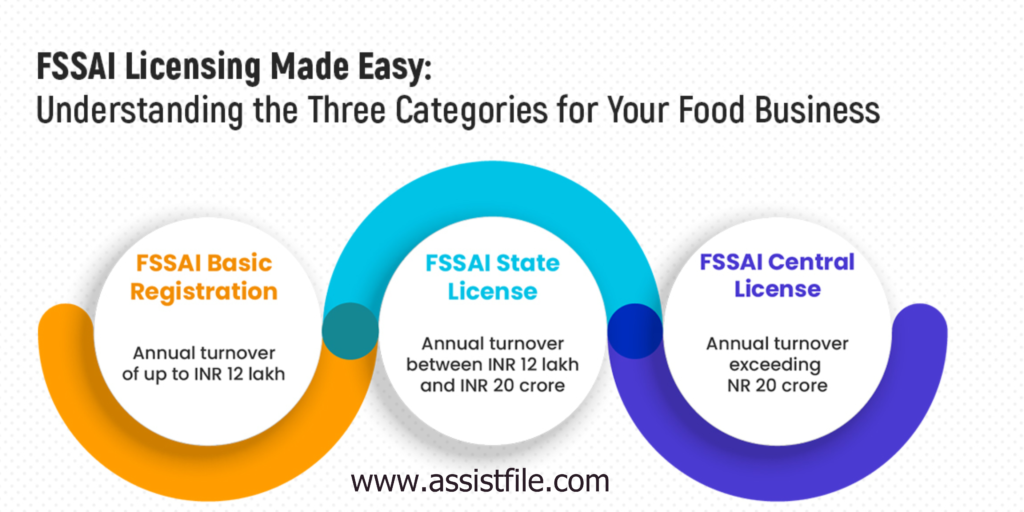India’s food sector is one of the most dynamic sectors in India, with its operations ranging across a broad activity spectrum from manufacturing and processing to distribution and retail. With increasingly demanding consumers’ quest for safer and quality foods, the role of strict regulatory mechanisms has perhaps never been so crucial. Understanding the Need for FSSAI License by Food Businesses in India. The Food Safety and Standards Authority of India (FSSAI) has a central role in ensuring that food businesses comply with safety standards and, in doing so, protect public health and build consumer confidence.

1. Legal Compliance and Mandatory Requirement
According to the Food Safety and Standards Act, 2006, all food businesses in India are required to get themselves registered or obtain an FSSAI license. This statutory obligation is extended to a wide variety of establishments such as manufacturers, processors, packagers, distributors, and retailers. The operation without this license can attract extreme penalties in the form of fines and the threat of shutting down the business.
2. Constructing Consumer Trust and Brand Image
In the competitive business environment of the present day, consumers are ever more conscious of the need for food safety. Understanding the Need for FSSAI License by Food Businesses in India. An FSSAI license is a badge of authenticity, ensuring customers that the food items they buy adhere to set standards of safety. Placement of the FSSAI logo on packaging and marketing materials can greatly improve a brand’s reputation, instill consumer confidence and loyalty. This confidence is precious, as it can result in repeat purchases and word-of-mouth recommendations.
3. Enabling Market Access and Expansion
An FSSAI license provides access to different business opportunities. Institutions like schools, hospitals, and government agencies demand that their suppliers have an FSSAI license. Such demand is also applicable for participation in tenders and contracts, domestic and foreign trade. For food exports, an FSSAI license is usually a precondition to accessing export markets, proving its adherence to food safety standards in the world.
4. Increasing Operational Efficiency and Standardisation
The FSSAI license process entails a detailed assessment of the operations of a food business, such as sourcing, processing, and storage. This examination promotes businesses to follow best practices and standardize their processes, resulting in enhanced operational efficiency. Periodic inspections and audits guarantee constant compliance with safety standards, which can lead to minimized wastage, efficient use of resources, and overall cost reduction.
5. Access to Government Schemes and Financial Support
FSSAI-licensed food businesses can avail themselves of several government schemes and financial aid programs designed to support growth and development in the industry. The schemes could cover infrastructure growth, technology uptake, and capacity improvement. Banks and other financial institutions also tend to favor lending to companies that adhere to regulatory guidelines, thereby increasing the ease of obtaining loans and credit facilities by FSSAI-licensed enterprises.
6. Risk Mitigation and Legal Protection
Foodborne illnesses can have serious implications for consumers and businesses alike. By complying with FSSAI regulations, food businesses can reduce the risk of contamination and guarantee the safety of their products. In case of a food safety problem, an FSSAI license offers legal recourse, as it proves the business’s dedication to adhering to stipulated safety procedures. This can prove to be vital in fending off accusations of negligence or misconduct.
7. Encouraging Innovation and Best Practices
FSSAI also inspires food businesses to implement new practices and technologies that promote food safety and quality. By establishing definite standards and regulations, FSSAI promotes a culture of improvement among the food industry, which accelerates the integration of best practices in the production, processing, and distribution of foods. This not only benefits consumers by providing them with safer and healthier choices but also propels innovation and efficiency in the food chain.
8. Import and Export Process Facilitation
For companies dealing in the export and import of food items, an FSSAI license eases customs clearance processes. It acts as a guarantee that products are safe and of good quality, making trade relations with countries of importation and exportation easier. This can result in less delay, reduced expenses, and increased competitiveness in foreign markets.
9. Consumer Protection and Public Health
The main aim of FSSAI is to safeguard and promote public health through regulation and oversight of food safety. Through ensuring food businesses adhere to safety standards, FSSAI prevents the sale of unsafe or adulterated food products. This preventive approach towards food safety leads to overall well-being among consumers and assists in making society healthier.
10. Competitive Advantage in the Marketplace
In a competitive and populous food market, differentiation is success. An FSSAI license gives a competitive advantage by indicating to consumers that an enterprise is concerned with safety and quality. This can be especially beneficial in a market where customers are willing to pay extra for products they view as safer and more trustworthy. The FSSAI logo can also be used to advertise, increasing brand visibility and attractiveness.
Conclusion
FSSAI maintains compliance with the law, inspires consumer confidence, simplifies access to the market, and ensures operational excellence. It also enables government support, manages risks, and encourages innovation. An FSSAI license, in effect, is not only a compliance regulation but also a strategic advantage that can be a driver for success and longevity for a food business.
For those in business and wishing to make a strong impression in the food sector, collaboration with entities such as Assistfile will make attaining an FSSAI license easier. Through professional advice and efficient services, Assistfile facilitates negotiation through the intricate web of food safety laws so businesses can concentrate on expansion and innovation.